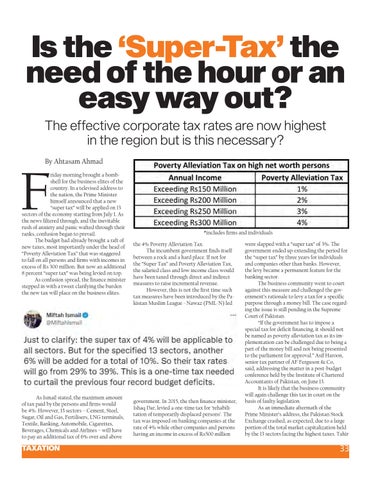Is the ‘Super-Tax’ the need of the hour or an easy way out? The effective corporate tax rates are now highest in the region but is this necessary? By Ahtasam Ahmad
F
riday morning brought a bombshell for the business elites of the country. In a televised address to the nation, the Prime Minister himself announced that a new “super tax” will be applied on 13 sectors of the economy starting from July 1. As the news filtered through, and the inevitable rush of anxiety and panic wafted through their ranks, confusion began to prevail. The budget had already brought a raft of new taxes, most importantly under the head of “Poverty Alleviation Tax” that was staggered to fall on all persons and firms with incomes in excess of Rs 300 million. But now an additional 8 percent “super tax” was being levied on top. As confusion spread, the finance minister stepped in with a tweet clarifying the burden the new tax will place on the business elites.
As Ismail stated, the maximum amount of tax paid by the persons and firms would be 4%. However, 13 sectors – Cement, Steel, Sugar, Oil and Gas, Fertilisers, LNG terminals, Textile, Banking, Automobile, Cigarettes, Beverages, Chemicals and Airlines – will have to pay an additional tax of 6% over and above
TAXATION
*includes firms and individuals the 4% Poverty Alleviation Tax. The incumbent government finds itself between a rock and a hard place. If not for the “Super Tax” and Poverty Alleviation Tax, the salaried class and low income class would have been taxed through direct and indirect measures to raise incremental revenue. However, this is not the first time such tax measures have been introduced by the Pakistan Muslim League - Nawaz (PML-N) led
government. In 2015, the then finance minister, Ishaq Dar, levied a one-time tax for ‘rehabilitation of temporarily displaced persons’. The tax was imposed on banking companies at the rate of 4% while other companies and persons having an income in excess of Rs500 million
were slapped with a “super tax” of 3%. The government ended up extending the period for the “super tax” by three years for individuals and companies other than banks. However, the levy became a permanent feature for the banking sector. The business community went to court against this measure and challenged the government’s rationale to levy a tax for a specific purpose through a money bill. The case regarding the issue is still pending in the Supreme Court of Pakistan. “If the government has to impose a special tax for deficit financing, it should not be named as poverty alleviation tax as its implementation can be challenged due to being a part of the money bill and not being presented to the parliament for approval.” Asif Haroon, senior tax partner of AF Ferguson & Co, said, addressing the matter in a post-budget conference held by the Institute of Chartered Accountants of Pakistan, on June 13. It is likely that the business community will again challenge this tax in court on the basis of faulty legislation. As an immediate aftermath of the Prime Minister’s address, the Pakistan Stock Exchange crashed, as expected, due to a large portion of the total market capitalization held by the 13 sectors facing the highest taxes. Tahir
33









